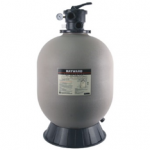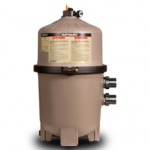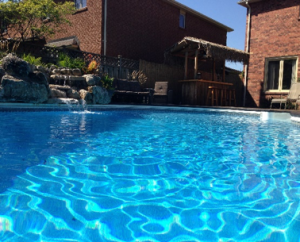One of the most important things to do when you have a pool is to ensure it is always clean by using the right types of filters. There are several forms of filters available for swimming pools, but choosing the right one can be difficult. Read our expert guide below to learn more about the pros and cons of different pool filter media.
Sand Filters
 The most commonly used filter is a sand filter.
The most commonly used filter is a sand filter.
Silica sand is used as the media to trap the dirt. It works relatively well, but it is by no means the best.
Over time, the sand calcifies and catches less and less dirt until, eventually, it has to be changed, usually after 4 or 5 years. This can become a hassle, rather than something that was meant to be helpful.
Zeobrite Pool Filters
A major improvement over sand media was a product known as Zeobrite.
It is a naturally occurring mineral and cleans considerably better than silica sand. A drawback, however, is that it is much more costly than sand.
Swimming Pool Cartridge Filters
Cartridge filters are a step up from sand filters, but they have a few major drawbacks.
 Replacement cartridges are expensive.
Replacement cartridges are expensive.- They only last an average of 4-5 years.
- They are also rather burdensome to clean — The filter tank has to be dismantled, and the filters soaked overnight in a large container with a cartridge filter cleaner, then hosed down, re-installed, and the tank put back together.
Diatomaceous Earth Filters
Diatomaceous Earth (D.E.) filters were very popular in the 60s and 70s.
They consisted of a grid system coated with the D.E. powder. It gave very fine filtration but, again, went out of favour because it was burdensome to maintain.
Sorel Mix Filters
A much superior media to the aforementioned filters and materials is Sorel Mix.
Here’s why:
- It is a natural stone with the most efficient and fastest filtering capacity.
- Its angular shape results in increased dirt collection compared to other media.
- Millions of tiny, three-dimensional, honeycomb pore spaces trap very small particles of dirt.
- A cubic foot of Sorel Mix has 100 times the surface area of a cubic foot of sand.
- Its effect on water clarity is so significant that it has the same qualities as drinking water.
- It is also non-porous, which helps prevent the formation of microscopic algae.
- It is very user-friendly and low maintenance — All it takes to clean it, is just the turn of a handle and the waste dirt is flushed out.
The most notable characteristic of Sorel Mix is that its lifespan can be measured in decades rather than years, and at the end of its useful life, it is 100% recyclable and can be returned to nature.
It’s the ultimate choice if you’re considering a pool, or looking to upgrade your current filtration system.
Which pool filter is right for you?
 It’s all dependent on your personal preferences and needs, but if you’re wanting a cost-effective, low-maintenance, and eco-friendly filtration system, we recommend Sorel Mix.
It’s all dependent on your personal preferences and needs, but if you’re wanting a cost-effective, low-maintenance, and eco-friendly filtration system, we recommend Sorel Mix.
Interested in a new filter? Let Leisure Industries help.
We built our reputation on precise, cost-effective and speedy new pool installation, but our experienced team can also install a new or upgraded filter for you whenever you need it.
Contact Us Today!
At Leisure Industries, we work with an educated and dedicated team of expert installers for every product we offer, and are always happy to help answer any questions you might have.
Contact us today to learn more about how you can improve your filtration.






